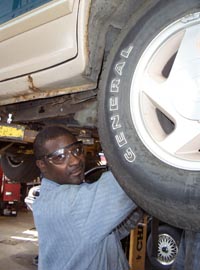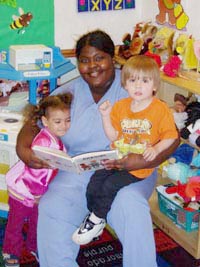Inside the Fall Issue:
Tom Chapin's
'Family Tree' of Music
Keeps Growing
The Chapin Family
Hits The Road For
Two November Tributes
How the Memory of
One Little Girl Has
Made a Difference
Harry's Spirit Fuels
Run Against Hunger
Diligence and a Smile
Pay Off In a Big Way
People Are The
Key To Success
For Esperanza Unida
Fan Fare
Capture The Holiday
Spirit With Celebrity
Cards While Helping WHY
Community Effort
Overcomes Setbacks
To Make Multi-Purpose
Field A Reality
KIDS Program Founders
Motivate New Generation
of Hunger Fighters
When several manufacturing plants in the Milwaukee, Wisconsin area closed down in the late 1970s and early 1980s, more than 100,000 area jobs were lost, a situation that was especially devastating to the Latino community. Some workers had not completed high school, others were at best semi-skilled, and most were unprepared for other jobs. Esperanza Unida (EU) - United Hope - met the challenge through the visionary leadership of Executive Director Richard Oulahan.
 EU was founded as a nonprofit organization in Milwaukee, Wisconsin, in the early 1970s to assist unemployed workers, particularly in the Latinos, who were either being denied benefits or didn't know they were entitled to them. At that time there were no Spanish-speaking employees in the city government departments that handled workers' compensation and unemployment insurance claims.
EU was founded as a nonprofit organization in Milwaukee, Wisconsin, in the early 1970s to assist unemployed workers, particularly in the Latinos, who were either being denied benefits or didn't know they were entitled to them. At that time there were no Spanish-speaking employees in the city government departments that handled workers' compensation and unemployment insurance claims.
Richard Oulahan, who joined EU in 1973 and became its executive director in 1978, provided the innovative leadership needed to find a solution to the employment crisis created by the de-industrialization in the area. Richard saw that many workers had skills that could be transferred to the automotive repair business. That was the inspiration for the creation of the Training Business Model. Through this program, workers are trained in EU-established businesses and then placed in jobs that provide family-supporting wages and benefits.
"In addition to auto repair, EU's other training businesses include: child care, printing, welding and metal fabrication, customer service and construction. The businesses themselves provide fully two-thirds of the income needed to sustain EU's programs, with the remainder coming from grants and donations.
A core principle of EU is to treat students like they matter. At one time, "...we had instructors who were saying 'we are going to tell you what to do and you have to conform.' The students were young and rebelling," Oulahan said.
"Then Jose, a carpenter instructor, came in and said, 'Que pasa?' (what's happening). Nobody had asked them what was going on or how they felt. The students picked up on it right away, and it changed the culture there because they were valued as people," Oulahan said.
Another key component is to find out and resolve any barriers to success. Since there is only one job for every eleven people looking, clients are taken in vans to places outside the city. For those with language deficiencies, "Working ten hours and having to travel two hours, when can you learn?" he said. EU's answer is the "English On The Bus" program that helps them make the best use of their time. "They really love it. It's simple and doesn't cost much," Oulahan said. "We treat them like they are family and try to help them from wherever they are stuck

Local businesses support EU's programs because they see that they encourage self-sufficiency and are anti-violence and crime. "Fear and hopelessness come from worrying about where am I going to get food and rent. Our programs are a tax saving because they keep people out of the penal system," Oulahan explained. "Volunteers provide business plans and pretty much any kind of business expertise. I may be talking to a group about our programs, and people say I've done this or that and ask to volunteer. More than economic resources, people come with ideas, energy, and spirit."
EU's latest venture is a temporary labor agency. "They have been a bane to our community," he said. "Nationally they are the largest employer. Workers are treated unfairly and don't get benefits. So we decided to start one ourselves and treat people like they matter."
A testament to the programs success is that 70 percent of EU's staff were students at one time. "They know what the students have been through. We bring them up through the system so they will continue to contribute. They are better managers because they have been there," Oulahan noted.
To learn more about EU and how you can help, visit their website at http://www.esperanzaunida.org.
Watch for the Next Issue of Circle! on December 7th
